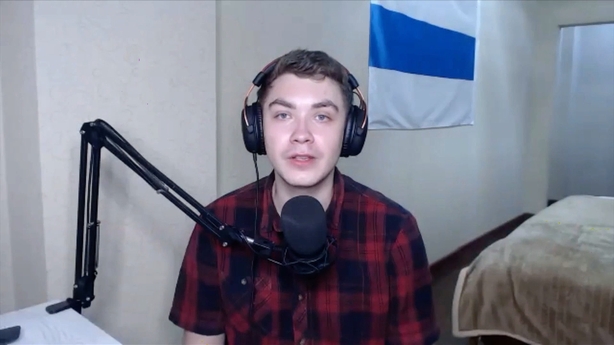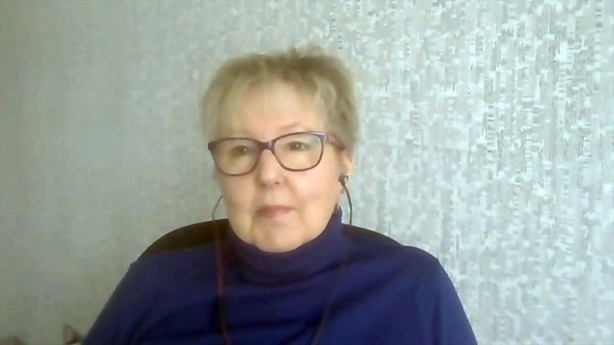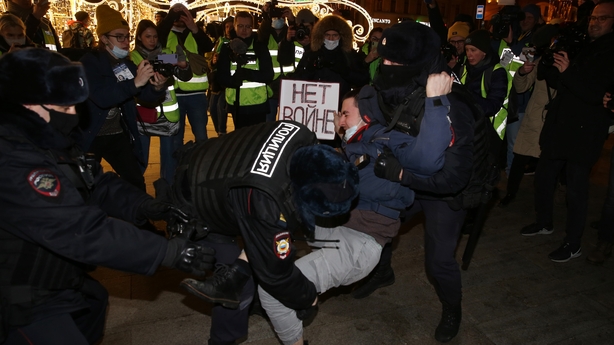On the day President Vladimir Putin announced Russia was invading Ukraine, an impromptu protest gathered at Pushkinskaya Square in Moscow.
Among the crowd was Zack, a 20-year-old student who disagreed with the decision.
He was filming when the Russian police chased multiple protesters down a busy thoroughfare. Unlike 1,700 other protestors across Russia that night, Zack somehow managed to evade arrest.
"I lost my mind. I was really scared because I just realised ... are they gonna arrest me? Are they gonna send me to the war in Ukraine? And of course I don't want to kill people."
Over the following days, one of his main concerns was whether he would be identified by authorities through facial recognition technology used by the Russian police. He made a swift decision to leave the country.
"In Moscow, there are so many cameras – they can easily find your apartment, where you live, and they just come to your apartment and arrest you. So, in a couple of days, I just left Russia."
For now, Zach told Prime Time that he's renting an apartment in Tbilisi, Georgia, where many other young Russians have fled.
"Most people my age have seen what freedom looks like. Most of them are against the war. For me, I've decided I don't want to come back to Russia until there is a democratic society."

Alisa was also at the same protest in Moscow. She had been based in the capital for five years and had recently finished her university course. Alisa also evaded arrest that evening, but the following morning the police arrived at her home.
"The next day, they came to the place where I should officially live," she said.
"The police found me very quickly the next day because the Moscow facial recognition system works very well."
Luckily, she was staying with a friend the night before. A flight to Istanbul was hastily booked – and she asked a friend to book her a taxi instead of using her own phone, since she was afraid she would be located.
"It was the most expensive flight ticket I ever bought. It was an emergency," she said.
She turned off her phone's location services, took out her sim card, and wore a mask on her journey to the airport to evade facial recognition.
Alisa hopes she can find work in Istanbul soon, because she only has enough cash to cover two months' rent – and her bank cards are not working.
In the early hours of 5 March, a Saturday morning, Moscow Times columnist Michele A Berdy woke in a panic, sat down at her computer and began searching the newspaper's website for any material that might get her or her colleagues into trouble.

The previous day, a new government law introduced in Russia effectively curtailed free speech by banning media outlets from using words like "war" and "invasion".
Instead, news outlets were told to use the term "special military operation" to describe the Russian campaign in Ukraine. Any deviation from that could potentially result in a prosecution.
As an American who had been living in Russia for the best part of 45 years, Michele said it was an act of repression that had not been seen since the days of the old Soviet Union.
"I woke up at 3am in the morning and I went into my kitchen and I turned on my cable TV and I had it fixed on CNN. And, instead of CNN, there was just an announcement that CNN was no longer airing in Russia," Michele told Prime Time.
"A lot of the news agencies were leaving – at least until they could figure out how they could work in Russia. And it was clear this law did apply to us."
Michele began to retroactively look for pieces that the Moscow Times had published about the conflict in Ukraine to amend them.
"I took out 'war' from headlines – 'attack',' invade', 'invasion'. I took out people's bylines because I thought that was going to be really dangerous," she said.
"I sat there and I took out every word that I thought was illegal and could get us in trouble."
Soon after, she left her home in Moscow and made the nearly 1,000km trip West by land to Riga in Latvia. It involved a border crossing from Russia to Estonia en route to Latvia in temperatures as low as −18°C.

"The distance between the Russian side of the border and the Estonian side was a couple of miles, so I was hauling 150lbs of luggage and keeping my dog on a leash and standing outside," she said.
"You hand your documents through a little window and the booth window snaps shut, and they do something on the computer for 15 minutes. And you have no idea what's going on."
Eventually, she was allowed through and, after arriving in Riga, she sourced an apartment.
It's bare compared to the apartment she called home in Moscow, which was decorated with art and books. But she's happy to be in a city where several other Russian journalists have also arrived in recent weeks.
If she had decided to stay in Moscow, Michele feared for her safety.
"I wouldn't have been able to keep my mouth shut," she said. "The fear is that I would have got myself in trouble."
Many of those who want to write about the war in Russia without fear of reprisal have joined Michele in relocating to neighbouring countries. For those who remain in Moscow, staying silent is the safest option.
"Nobody is speaking out. Everyone is being careful. Most of the people who wanted to speak out left. Sadly some of my acquaintances are getting their news from Russian television," she said.







